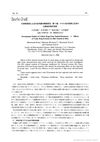 12 citations,
January 1988 in “YAKUGAKU ZASSHI”
12 citations,
January 1988 in “YAKUGAKU ZASSHI” Certain natural extracts can promote hair regrowth.
 14 citations,
January 2016 in “Biochemical and Biophysical Research Communications”
14 citations,
January 2016 in “Biochemical and Biophysical Research Communications” Ginsenoside Re from ginseng may help hair grow by blocking a specific growth-inhibiting pathway.
August 2015 in “한국식품영양과학회 산업심포지움발표집” December 2009 in “한국인체미용예술학회지” The herb extract helped prevent hair loss and promote hair growth.
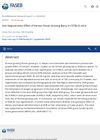 April 2010 in “The FASEB Journal”
April 2010 in “The FASEB Journal” Korean ginseng berry may help with hair regrowth.
 3 citations,
April 2022 in “Farmacia”
3 citations,
April 2022 in “Farmacia” Certain foods and supplements can help treat skin diseases alongside medication.
 3 citations,
June 2019 in “Asian Journal of Biological Sciences”
3 citations,
June 2019 in “Asian Journal of Biological Sciences” Indian Ginseng may help promote hair growth for treating alopecia.
 8 citations,
November 2015 in “Saudi Journal of Biological Sciences”
8 citations,
November 2015 in “Saudi Journal of Biological Sciences” A mix of Panax ginseng and bee-pollen may help prevent prostate enlargement in rats.
 1 citations,
May 2019 in “Bioactive compounds in health and disease”
1 citations,
May 2019 in “Bioactive compounds in health and disease” Certain vitamins, minerals, and foods like black raspberry extract and egg yolks can help reduce hair loss and promote hair growth.
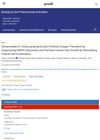 January 2024 in “Biological & pharmaceutical bulletin”
January 2024 in “Biological & pharmaceutical bulletin” Panax ginseng extract helps human hair grow by encouraging growth phase transition and cell proliferation while reducing certain protein expression.
January 2015 in “프로그램북(구 초록집)” Korean Red Ginseng may help prevent hair loss from chemotherapy.
 15 citations,
June 2011 in “Journal of Ginseng Research”
15 citations,
June 2011 in “Journal of Ginseng Research” Korean Red Ginseng may improve skin condition and reduce allergy markers in atopic dermatitis patients.
 14 citations,
January 2014 in “International Journal of Dermatology”
14 citations,
January 2014 in “International Journal of Dermatology” Minoxidil with Korean red ginseng improves hair density and thickness more than minoxidil alone.
January 2012 in “프로그램북(구 초록집)” 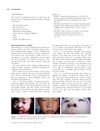 4 citations,
December 2013 in “International Journal of Dermatology”
4 citations,
December 2013 in “International Journal of Dermatology” Three children with nasal fungal infections were successfully treated with potassium iodide and sometimes itraconazole.
1 citations,
October 2010 in “Pediatrics in review” Some alternative therapies might help treat eating disorders when combined with standard care, but more research is needed to confirm their safety and effectiveness.
10 citations,
January 2015 in “European journal of pharmacology” Ginsenoside Rb1 may help remodel hypertrophic scars effectively at a dose of 0.56 mg.
18 citations,
December 2016 in “European journal of pharmacology” A new compound slows cancer cell growth and causes cell death by blocking cell cycle progression and increasing cell-damaging molecules.
2 citations,
January 2017 in “Case reports in endocrinology” Ashwagandha root improved symptoms of nonclassic 11-hydroxylase deficiency in an elderly woman.
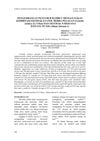 December 2021 in “Jurnal ilmiah Manuntung”
December 2021 in “Jurnal ilmiah Manuntung” The best hair growth results were achieved with a hair tonic containing 5% gotu kola extract and 0.04% garlic extract.
 10 citations,
October 2019 in “Acta Pharmaceutica”
10 citations,
October 2019 in “Acta Pharmaceutica” Medicinal plants are used to treat skin conditions, but more evidence is needed before recommending them widely.
 118 citations,
July 2005 in “Journal of Ethnopharmacology”
118 citations,
July 2005 in “Journal of Ethnopharmacology” Eclipta alba extract improved learning, memory, and stress-related ulcers in rats without affecting movement or causing anxiety.
 122 citations,
May 2010 in “Plant Physiology”
122 citations,
May 2010 in “Plant Physiology” Different PIN proteins affect plant root hair growth by changing how auxin is transported.
 November 2017 in “Asian journal of pharmaceutical and clinical research”
November 2017 in “Asian journal of pharmaceutical and clinical research” Three compounds from Dadap leaves may help treat hair loss.
 1 citations,
June 2019 in “Innovare journal of medical sciences”
1 citations,
June 2019 in “Innovare journal of medical sciences” Polycystic Ovary Syndrome (PCOS) is a hormonal disorder in women that can cause infertility and other health issues, and it may be improved by treatments that increase insulin sensitivity.
 13 citations,
January 2015 in “Evidence-based Complementary and Alternative Medicine”
13 citations,
January 2015 in “Evidence-based Complementary and Alternative Medicine” Garlic chive extract helped mice grow more hair by increasing a specific growth factor.
20 citations,
December 2013 in “PTR. Phytotherapy research/Phytotherapy research” Ginsenoside Rg3 may help hair growth by increasing a growth-related protein in hair cells.
 6 citations,
May 2022 in “Aging”
6 citations,
May 2022 in “Aging” Si Jun Zi Tang may slow aging by affecting specific cell signaling pathways.
 February 2024 in “Biomedical materials”
February 2024 in “Biomedical materials” Scientists created a lab-grown hair follicle model that behaves like real hair and could improve hair loss treatment research.
 7 citations,
July 2018 in “Biological & Pharmaceutical Bulletin”
7 citations,
July 2018 in “Biological & Pharmaceutical Bulletin” Phyllanthus urinaria extract may help treat hair loss by blocking a hair-related enzyme.





















